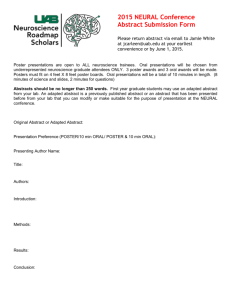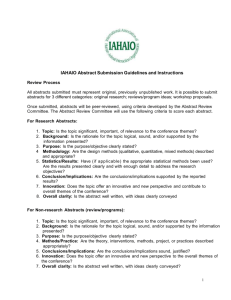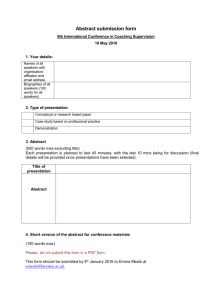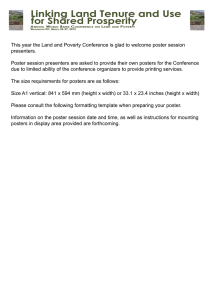Abstract Guidelines Full Abstract Submission Guidelines Abstracts
advertisement
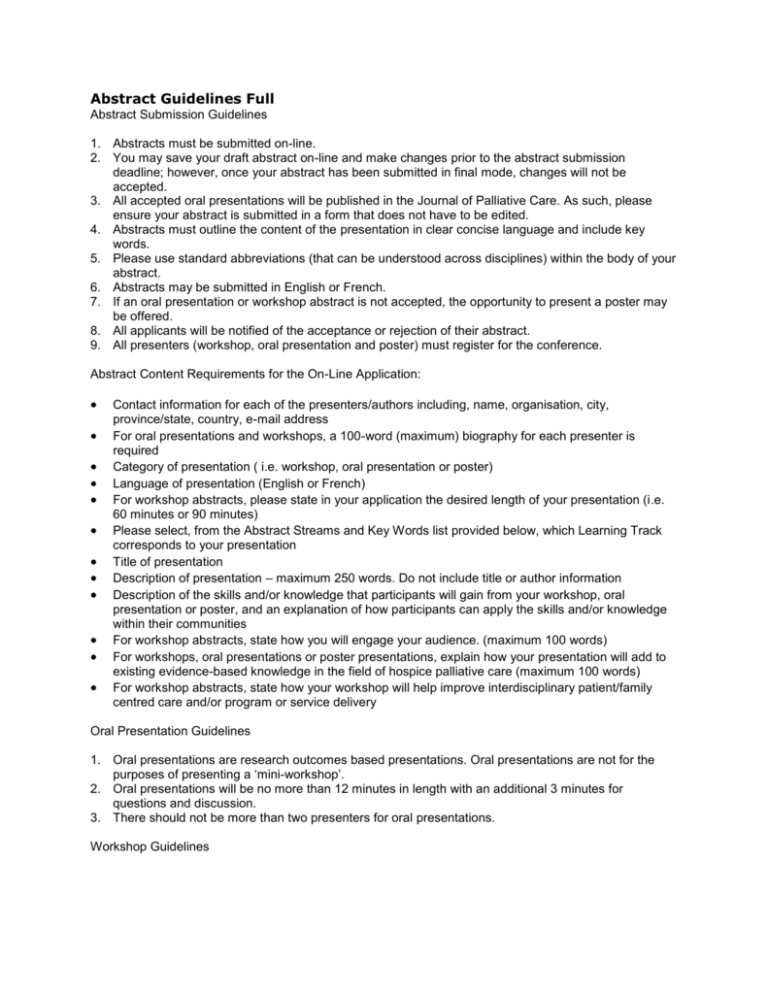
Abstract Guidelines Full Abstract Submission Guidelines 1. Abstracts must be submitted on-line. 2. You may save your draft abstract on-line and make changes prior to the abstract submission deadline; however, once your abstract has been submitted in final mode, changes will not be accepted. 3. All accepted oral presentations will be published in the Journal of Palliative Care. As such, please ensure your abstract is submitted in a form that does not have to be edited. 4. Abstracts must outline the content of the presentation in clear concise language and include key words. 5. Please use standard abbreviations (that can be understood across disciplines) within the body of your abstract. 6. Abstracts may be submitted in English or French. 7. If an oral presentation or workshop abstract is not accepted, the opportunity to present a poster may be offered. 8. All applicants will be notified of the acceptance or rejection of their abstract. 9. All presenters (workshop, oral presentation and poster) must register for the conference. Abstract Content Requirements for the On-Line Application: Contact information for each of the presenters/authors including, name, organisation, city, province/state, country, e-mail address For oral presentations and workshops, a 100-word (maximum) biography for each presenter is required Category of presentation ( i.e. workshop, oral presentation or poster) Language of presentation (English or French) For workshop abstracts, please state in your application the desired length of your presentation (i.e. 60 minutes or 90 minutes) Please select, from the Abstract Streams and Key Words list provided below, which Learning Track corresponds to your presentation Title of presentation Description of presentation – maximum 250 words. Do not include title or author information Description of the skills and/or knowledge that participants will gain from your workshop, oral presentation or poster, and an explanation of how participants can apply the skills and/or knowledge within their communities For workshop abstracts, state how you will engage your audience. (maximum 100 words) For workshops, oral presentations or poster presentations, explain how your presentation will add to existing evidence-based knowledge in the field of hospice palliative care (maximum 100 words) For workshop abstracts, state how your workshop will help improve interdisciplinary patient/family centred care and/or program or service delivery Oral Presentation Guidelines 1. Oral presentations are research outcomes based presentations. Oral presentations are not for the purposes of presenting a ‘mini-workshop’. 2. Oral presentations will be no more than 12 minutes in length with an additional 3 minutes for questions and discussion. 3. There should not be more than two presenters for oral presentations. Workshop Guidelines 1. Workshop presentations are interactive skills-based presentations. Workshop presentations will vary from 60 to 90 minutes in length. If your workshop is accepted, we will inform you of the exact length of your workshop. 2. Workshops must be interactive, and include practical information that participants can bring back to their communities. 3. Each meeting room will be equipped with a laptop computer that includes a DVD player, a LCD projector and screen, a podium microphone, and one lavaliere microphone. Cordless microphones may also be available depending upon the size of the meeting room. 4. Please bring your presentation with you on a memory stick or CD. Your presentation must be Windows compatible. 5. If you require additional equipment for your workshop, you will need to make your own arrangements with the audio visual company, at your own expense. Conference staff can provide you with the contact information for the audio visual company. Poster Guidelines . 1. Posters presentations include the key learning and knowledge points you wish to share with conference participants. 2. Poster presenters are expected to register for the conference. 3. Poster presenters are required to be present at their poster for the duration of the Opening Reception. 4. Exact specification regarding poster dimensions will be communicated to successful poster presenters. Abstract Review All abstracts will be blind-reviewed by the Abstract Review Committee. (Identifying information will be removed from abstracts before they are evaluated.) Each abstract will be reviewed by a minimum of two reviewers, and will be accepted based on the following criteria: The abstract adds to existing knowledge, is innovative, and is evidence-based The abstract offers concrete skills to participants The abstract contributes to the themes of the conference The abstract is relevant to hospice palliative care Abstract Streams & Key Words Advocacy and Organizational Development Models of Access to Service Delivery Marginalized Populations Multi-Cultural Issues Volunteer Issues Mental Health Rural and Remote Issues Aboriginal Issues Practical Skills and Skills Building Pediatric Issues Advance Care Planning Organizational Issues Hospice Development Communication and Advance Care Planning Communication and Media Strategies Social Media and Marketing in Health Care Settings Developing Key Messages Advance Care Planning Marginalized Populations Pediatric Issues Program Development and Evaluation Discussions of Evidence-Based Practical Applications (Lived Experience) Developing Key Performance Indicators Strategic Planning Pediatric Issues Marginalized Populations Interprofessional Education and Practice Policies and Trends Interdisciplinary Competencies Education Models Effective Teaching Tools Patient / Family Centred Education Interprofessional Education Competency Based Education Continuing Professional Development Pediatric Issues Marginalized Populations Clinical Practice Pain and Symptom Management Self Care Ethics of Palliative Care Culturally Competent Care Pediatric Issues Marginalized Populations Research Institute Health Science Research and Economics Knowledge Translation and Exchange Policy and Decision Making International Linkages Pediatric Issues Marginalized Populations Hospice Palliative Care Long Term Care Advance Care Planning Ageing Caregiving *Please note that the above key words are only some possible suggestions. If you have other relevant keywords that are not included in the above list and you wish to know if this is an eligible topic, please contact CHPCA Staff Cheryl Spencer at cspencer@bruyere.org.
